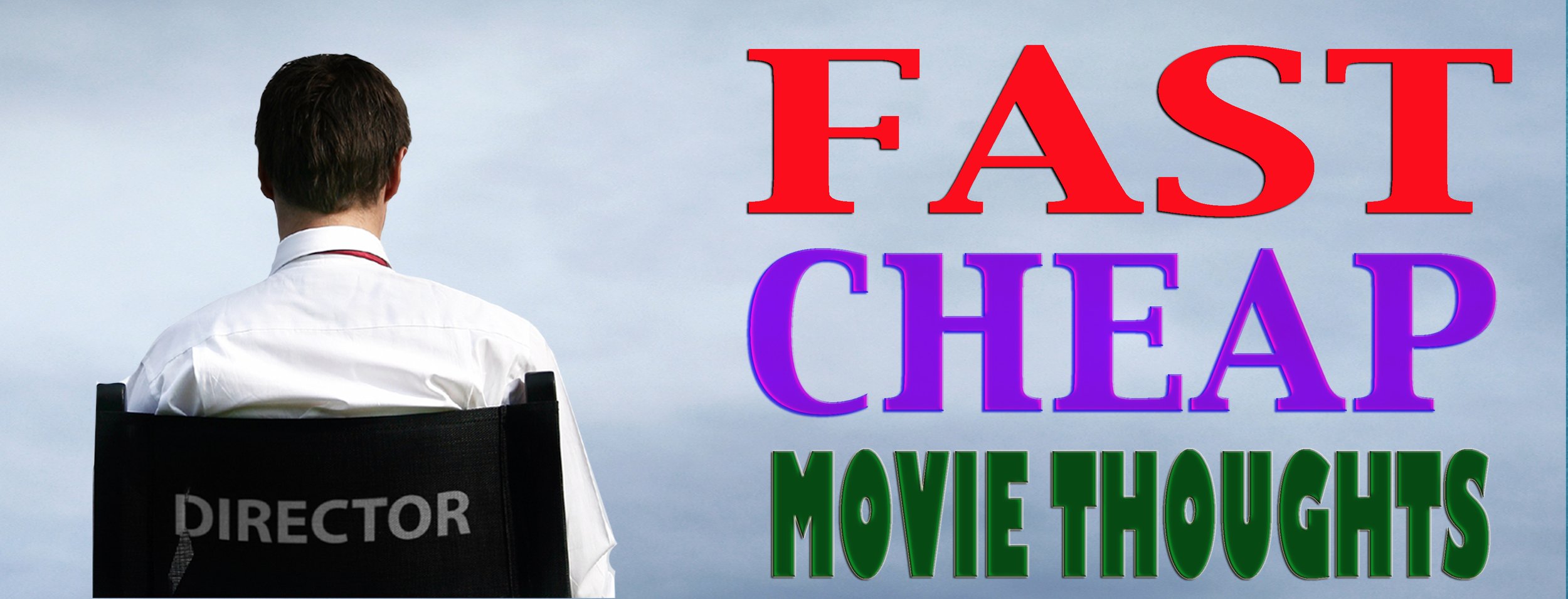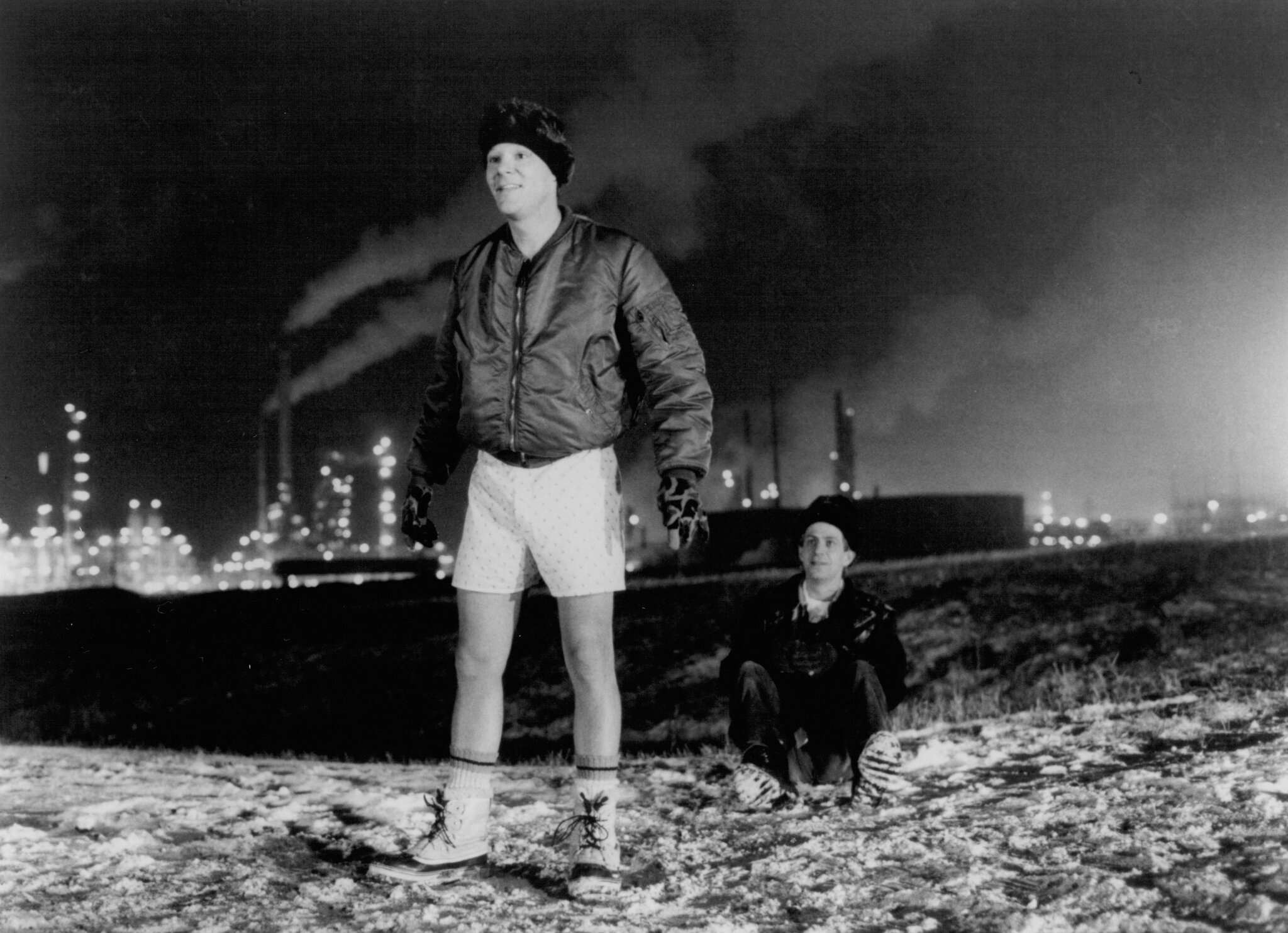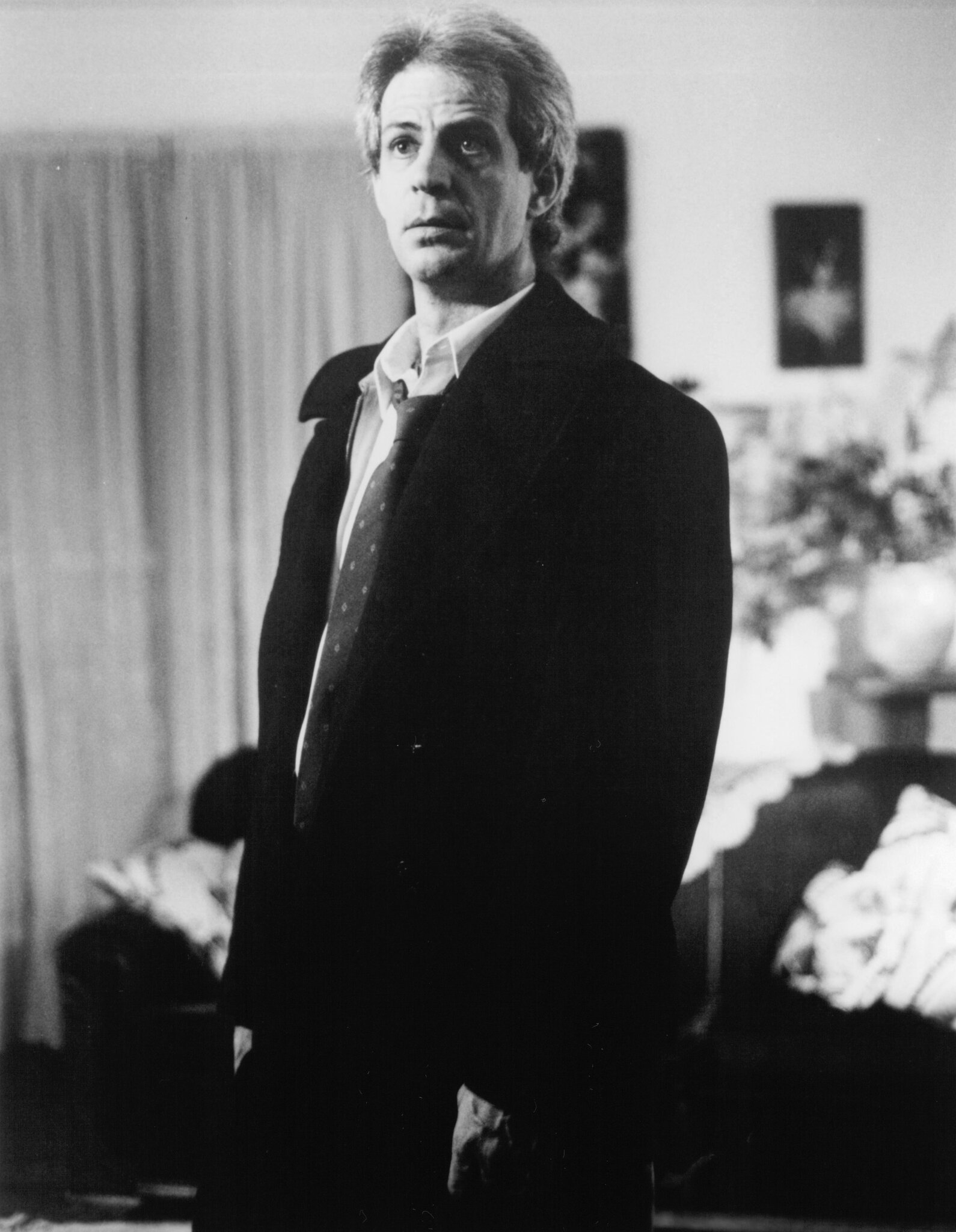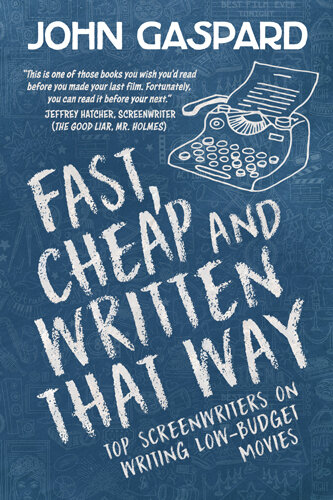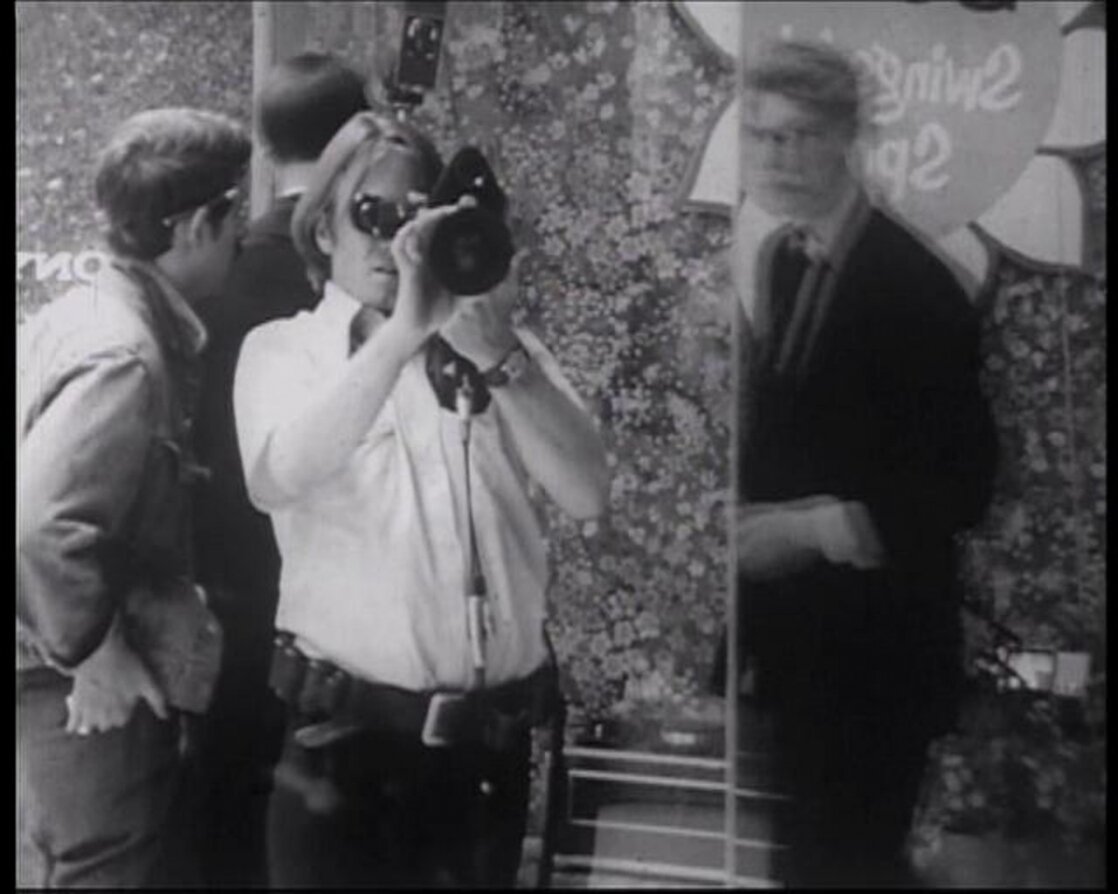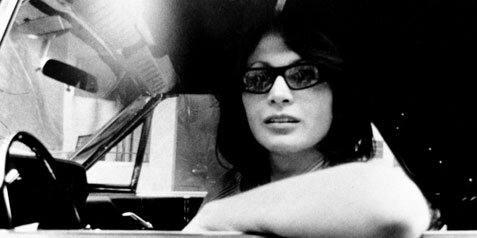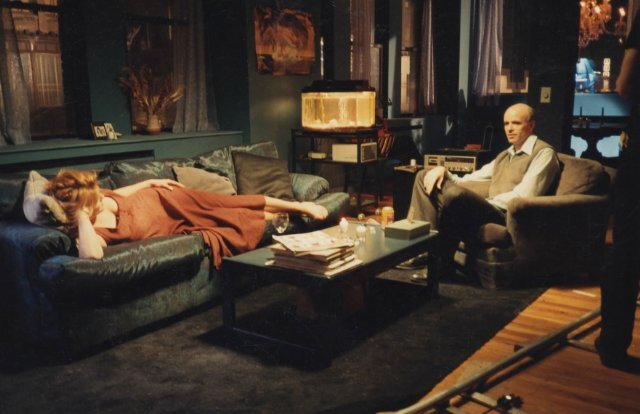In 1987, the film “Patti Rocks” was produced in Minnesota. In 2004, I chatted with three of the people who instrumental in getting it made: Director and co-writer David Burton Morris; producer, DP and editor Greg Cummins, and actor and co-writer John Jenkins.
Patti Rocks is a sequel of sorts to your earlier film, Loose Ends. How did that first film come about?
DAVID BURTON MORRIS (Director, Co-Writer): I saw Memories of Underdevelopment, a Cuban Film, at the Walker Art Center, and I rushed home to my wife, Victoria, and I said, 'You know, we can make a movie really cheap. I just saw this great movie, it was black and white. If we can scrape together $20,000, we can make a movie.'
And so we did. She wrote it. And it shot for two weeks. Loose Ends was sort of a calling card. We went to 20-25 film festivals, didn't win anything really, but Roger Ebert discovered us and Vincent Canby and Andrew Sarris and we got all these great notices.
However, it was nearly twelve years before the sequel, right?
MORRIS: We finally got enough money, in the early 80s, to do a movie called Purple Haze, and that did very well. It won Sundance, and that was our first real movie. It was 35mm, color, we had an actual shooting schedule and a budget. And that did very well. And we looked like we were on our way.
I then, subsequently, got fired from two studio pictures and was very unhappy—we're now talking mid-80s—and I was thinking about quitting, I was thinking about getting out of the business because I was really unhappy. And I thought back to the only time I had a really good time making a movie, which was on my first film, Loose Ends. And I thought, maybe I should think about writing something for those guys and making it back in Minnesota and sort of re-creating my enthusiasm for making movies.
Hence the title in the credits, '12 years later.' A lot of people don't get that, but when it screened at Sundance they showed them both, which was nice, so that people could watch the first one and then pick up with the same two guys 12 years later.
CUMMINS (Producer, DP, Editor): When Patti Rocks came about, David had moved to Los Angeles and was working out there, doing the Hollywood thing, and he met Gwen Field. Gwen was taking her daughter to the same day care that David was taking his daughter to, and they got to know each other, and David pitched the idea of Patti Rocks to her.
How did the script come together? I know you started with improvisations …
MORRIS: We did a lot of just riffs on sex. We had another movie in mind. And I had all these long cassette tapes filled with (Chris) Mulkey and (John) Jenkins riffing on women, and I thought, this is interesting. Somehow I got the idea of putting them in the car, driving all night to see Patti to talk her into having an abortion. I did a first draft and I'd give it to them and we'd tinker with it and do some more improvs. Jenkins lived in Chicago, so we flew there a couple times and did some more improvs, and then I'd type that up.
JOHN JENKINS (Actor, Co-Writer): It started with some general conversations about what we might do, and then we started to improv a little bit. David then took that and began to craft a plotline for this.
Then after we had that in place, we got back together again and we spent some more time improvising the script. And so the script really came out of those improvisations that Chris and Karen (Landry) and I did.
Then David would edit that and cut and paste and re-arrange. He might add some other dialogue on top of that, but most of it came out of those improvs.
Where did the title come from?
MORRIS: The way I got the title was interesting. I was at the Chicago Film Festival, on a panel. I was at dinner with a group of people from the festival and this woman was sitting next to me. I said, 'What do you do?' She said, 'I sing in a band.' I said, 'What's the name of the band?' She said, 'Patti Rocks.'
And I said, 'Oh, that's a really good title.'
How did you get the film financed?
MORRIS: I'd known Sam Grogg, because he was head of the USA Film Festival in Dallas. And he'd started a film company called Film Dallas. So I gave him the script and said, 'What do you think?' He said, 'We'll make it.'
It was the easiest thing I've ever done. I wrote it and within a month they'd given me $400,000 to make this movie.
He had very few notes. He just said, 'They have to get out of the car midway through the movie.' I said, 'What do you want them to do? See a flying saucer?' He said, 'I don't know, you'll think of something.'
Did the script change much besides that before you shot?
MORRIS: My wife, Victoria, helped a lot on the third act. She said, 'The Patti character has got to be a strong, liberated, likeable woman.' So I took those notes and did a re-write on it, and Karen Landry brought a lot of insight into the character.
I wrote it for the summer, because Mulkey's running around in his underwear. But we couldn't get it all together, and we got the money in November, and I said, 'We're going to make the movie. We've got the money, we're going.'
And it actually turned into a more interesting film, just because of the look of the snow and Mulkey running around in his underwear in 23 degrees below zero.
I thought, two guys in a car? How expensive can that be? But, because of the cold, it was brutal. I mean, it was just really brutal—cameras freezing and all of us crammed in, in snow parkas, in the back seat, shooting at night in the middle of the winter. It was insane.
CUMMINS: In theory, David was right, it was a very simple idea: two guys in a car. But add in the car, add in winter, add in nights …
One of the great things in the movie is how you capture just how cold a Minnesota winter can be. You can really feel it while watching the movie.
JENKINS: The weather was unbelievable, especially when we were shooting the sequence where they get out of the car. It must have been thirty below when we were shooting that scene.
CUMMINS: We shot Loose Ends in the summer, in July, and it was one of those horribly hot summers. Basically, it was heat and sweat and working really hard and rigging lights in Midway Chevy’s repair department when it was 100 degrees out.
And then we turned to Patti Rocks and it's just the opposite. We were shooting in December, and it was the coldest December on record. We were on the camera car with 60 degree below zero wind chills.
JENKINS: We were in this trailer and we would come out; we could only shoot this stuff for four or five minutes at a time before the fear of frostbite or hypothermia would come up. Chris was in great shape and even at that it was brutal. When it came to looking cold, no sensory work was required.
CUMMINS: The camera got so cold most of the time that it was squeaking. When it dropped below 20 below, the camera ran fine but there was this high-pitched squeak every few seconds. We couldn't figure out what it was for the life of us. It would go away when we'd take the camera into the trailer, and then we'd go back to the car and it would do it again. It was just the cold.
MORRIS: The lesson from Patti Rocks was, when you get the money, make the movie, regardless of what season it is.
The film is a three-hander, but we spend so much time in the car that it also feels like a character in the story.
CUMMINS: While scouting locations, there was a car for sale. So, we stopped right there and bought the car—it was for sale on the side of the road. Without thinking about anything. How would this car rig, what does it sound like? It was the perfect car for the character, but not the perfect car to shoot in.
It was a two-door. We loaded the camera in the car, we had David and myself and the sound man all rammed in the backseat, depending on where we would rig the camera for the shot. It was long before video assist, so we had to be in the car, seeing what was going on, in order to see the performance.
Did you ever consider just using process shots, instead of shooting while driving?
CUMMINS: I didn't want to do process, I felt it would cheapen the film to do process all the time. But I don't think any of us really realized how difficult all the shots were going to be.
Before we shot the film, we knew that the car was a character in the film. The car was as important, in some ways, as Billy and Eddie. And so we planned out a myriad of placements for the camera—we could put the camera here on the front of the hood, to the right of the hood, to the left of the hood, and so on.
And then what I did was work through that process from the beginning of the film through the end. None of the camera placements really repeat. They move and they evolve. And so the car changes with each story they tell, and it becomes more intimate. And it becomes really intimate before they arrive at Patti's apartment.
We worked very hard to keep that part of the cinematography alive. It was very hard to do, and very confusing. We shot a lot of stuff that didn't get into the film, stories that didn't quite work as well as other stuff. Keeping track of camera placement became very complex, especially with a small crew. We had one person on continuity, who basically couldn't be in the car. How do they do their job? It's a big challenge, so continuity fell to David and myself, really.
Shooting in a car, a black car, with black upholstery, in the middle of nowhere, in the middle of the night, with minimal equipment, in the cold, was brutal. Absolutely brutal.
So not only were you shooting in the cold, in a car not designed for shooting, but you were also shooting at night …
CUMMINS: It was a road film, but when we started out, we didn't know it was going to be a nighttime road film. Which made it even more difficult.
We wanted to play it almost real time—they left in the afternoon, they got together, they had a couple of beers and they took off and night fell. In the winter, night falls around here at about 4:30 in the afternoon. And so they drove all night to get to her apartment, and they get there sometime in the middle of the night and leave the next day at dawn—it's all in one day.
Life would have been easier if they'd started with breakfast, then driven down and gotten there about four in the afternoon—that would have been wonderful.
From an acting technique point of view, how did you recreate what you had done in the improvisations while shooting?
JENKINS: It's an interesting problem, to use improv to create a script, and then to go back and play it. It's a funny thing. When you're improvising the thing, you're so involved in the problem and the words just flow out.
But when you go back to do it again, you've forgotten a lot of that structure or the dynamic that allowed those words to flow. So you're left with a script and you know it's yours, but it's hollowed out. You've forgotten the context a little bit.
It's almost easier to take somebody else's words and to slip on your imagination and work with that, then to go back and do your own stuff. I found that to be a little difficult.
I had to do all the actorly stuff and fill it out, sensory work and subtext to try to get back to that improv state that had been so easy. It was just odd. You would think that it would just be a piece of cake, the easiest thing to do, and I found it perplexingly difficult.
The film became somewhat controversial, due to its language. Were you aware that might be an issue while you were shooting?
CUMMINS: Oh, absolutely. We set out to do that.
The thinking was, these are two guys and this is the way guys talk. If you put two kind of raunchy guys together, this is how they talk. There's nothing unreal about this. And essentially that's what we wanted to do: present two guys who are completely uninhibited and unobserved, talking in the way that we felt some people do. Sam Grogg felt the language was its strong point, that's what the film was about.
MORRIS: I thought it was risky, in terms of the subject matter. I didn't know until after it was done how people would react to the language in the picture. The ratings board first gave us an X for language, and that had never happened before. I guess I was just so used to it. Not that I talk that way, but certainly I hear that. I was kind of surprised by the reaction.
JENKINS: I didn't think it would be controversial. It wasn't violent, there wasn't any hard porn. It's odd about it now, but we got in trouble for the language. You listen to HBO, and you listen to something like Deadwood, and it seems odd to me. But that was a vastly different time, in terms of what kind of language you could use in a film.
MORRIS: When I first started putting this together, I thought people are either going to love or hate this. I had no idea it was going to divide audiences. And it did. People loved the movie or hated the movie. More people loved it, thank god, than hated it.
JENKINS: That was just the way we talked, but in an exaggerated way. It seemed appropriate to these two guys and the way they would talk. It felt true to us.
MORRIS: At the very few personal appearances I made before the movie, I'd say, 'Some of you people might get uncomfortable during the first two acts of this movie. Just wait, okay?'
CUMMINS: When we screened the answer print for the first time, in California, all of a sudden Sam Grogg, who was with FilmDallas, brought five or six people into the screening room. He wanted them to see it, but we hadn't even seen the film yet. But we really couldn't turn him down, so we watched the film, and afterwards Sam says to them, 'See what you can do for a half a buck?' They were his next round of directors, and he was pressuring them to keep their budgets low.
MORRIS: We had a lot of screenings in Los Angeles before it opened up, and it was sort of a word-of-mouth hit, as far as people going to these screenings. Sean Penn, Madonna were there. I just hate watching my films with audiences. It makes me uncomfortable. So I never went to these screenings.
In addition to the language, the film also includes a sex scene. How was that handled?
JENKINS: It was difficult to do. I'm doing a love scene with my best friend's wife—my real best friend's wife. It was potentially explosive. I thought we handled that part of it well. We got to the point where both Karen and I felt comfortable to do the scene. I thought we were able to finesse it all right.
CUMMINS: There was a level of trust in the sex scene. This is Chris's wife, who's making love with John Jenkins. This is a difficult scene. It's difficult to have your wife in a nude scene, it's difficult to be in the same film with your wife in a nude scene, it's difficult to have your wife making love to your friend as a character, but he's a real-life friend.
We created a lot of really difficult situations that we were able to get through because of that trust that we had with each other.
What did you learn while making Patti Rocks that you still use today?
JENKINS: Work with people that you know and trust. I know that's hard to do. A lot of this work is going to be like blind dates with strangers to put these things together. I was fortunate to be able to work with people I loved and trusted. If possible, for your first steps out, to do it in a way that you were protected in that way would be great. Look for that.
CUMMINS: One of the best decisions I made as producer was insisting upon getting the best people, friends who were really capable, and to stand up for them.
Film is a collaborative art, there's no question. Everybody says that. You can't really do it by yourself, you really need other people, other expertise, other views, other opinions. You need people in the process. And the closer you are to those people, the less explaining you have to do, the more intuitive working relationship you can have, the faster you're going to be able to work, the better off you're going to be.
The most important thing that I say to everybody is that you have to listen. You have to listen to other people, because they're telling you something.
Everybody really has something to give, and it seems like too often we're not listening to those voices.
If you can sit and hear people, and be quiet, I think you'll learn a lot. You take in a lot just by being there, rather than trying to dominate everything.
Dying to make a feature? Learn from the pros!
"We never put out an actual textbook for the Corman School of Filmmaking, but if we did, it would be Fast, Cheap and Under Control."
Roger Corman, Producer
★★★★★
It’s like taking a Master Class in moviemaking…all in one book!
Jonathan Demme: The value of cameos
John Sayles: Writing to your resources
Peter Bogdanovich: Long, continuous takes
John Cassavetes: Re-Shoots
Steven Soderbergh: Rehearsals
George Romero: Casting
Kevin Smith: Skipping film school
Jon Favreau: Creating an emotional connection
Richard Linklater: Poverty breeds creativity
David Lynch: Kill your darlings
Ron Howard: Pre-production planning
John Carpenter: Going low-tech
Robert Rodriguez: Sound thinking
And more!
Write Your Screenplay with the Help of Top Screenwriters!
It’s like taking a Master Class in screenwriting … all in one book!
Discover the pitfalls of writing to fit a budget from screenwriters who have successfully navigated these waters already. Learn from their mistakes and improve your script with their expert advice.
"I wish I'd read this book before I made Re-Animator."
Stuart Gordon, Director, Re-Animator, Castle Freak, From Beyond
John Gaspard has directed half a dozen low-budget features, as well as written for TV, movies, novels and the stage.
The book covers (among other topics):
Academy-Award Winner Dan Futterman (“Capote”) on writing real stories
Tom DiCillio (“Living In Oblivion”) on turning a short into a feature
Kasi Lemmons (“Eve’s Bayou”) on writing for a different time period
George Romero (“Martin”) on writing horror on a budget
Rebecca Miller (“Personal Velocity”) on adapting short stories
Stuart Gordon (“Re-Animator”) on adaptations
Academy-Award Nominee Whit Stillman (“Metropolitan”) on cheap ways to make it look expensive
Miranda July (“Me and You and Everyone We Know”) on making your writing spontaneous
Alex Cox (“Repo Man”) on scaling the script to meet a budget
Joan Micklin Silver (“Hester Street”) on writing history on a budget
Bob Clark (“Children Shouldn’t Play with Dead Things”) on mixing humor and horror
Amy Holden Jones (“Love Letters”) on writing romance on a budget
Henry Jaglom (“Venice/Venice”) on mixing improvisation with scripting
L.M. Kit Carson (“Paris, Texas”) on re-writing while shooting
Academy-Award Winner Kenneth Lonergan (“You Can Count on Me”) on script editing
Roger Nygard (“Suckers”) on mixing genres
This is the book for anyone who’s serious about writing a screenplay that can get produced!

